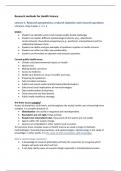Samenvatting
Samenvatting - Research Methods for Health Sciences (AM_1255)
Samenvatting van de lessen, Powerpoints en literatuur van het vak Research Methods voor Health Sciences. Summary of the lectures, powerpoints and literature of the course Research Methods for Health Sciences.
[Meer zien]




